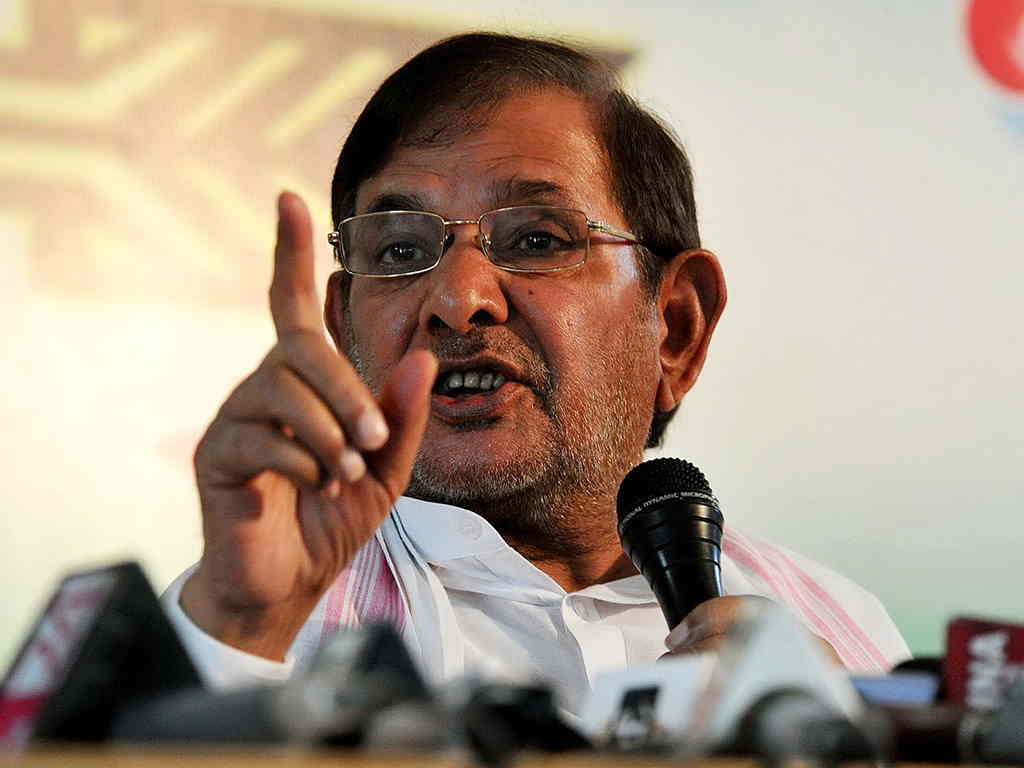In an another move towards an impending split in JD(U), its senior leader Sharad Yadav announced that he would organise a ‘Sajha Virasat Bachao Sammelan’ on Thursday, August 17, aimed at saving India’s “composite culture”, at the Constitution Club here.
Top leaders of the Congress, the Left, Samajwadi Party, BSP, TMC, other parties opposed to the BJP, intellectuals, farmers, Dalits and tribals from across the country have been invited to the programme which is being seen as Yadav’s show of strength against his party chief Nitish Kumar’s decision to ally with the BJP.
This will be the next big gathering of the opposition after it decided to launch a joint campaign against the ruling party. The conference comes days after Yadav held road shows in Bihar. Several leaders close to him are being targeted by the leadership with 21, including Dalit leader and former minister Ramai Ram, being suspended from the party on Monday for their participation in Yadav’s road shows. The political dais to centrestage “secular values” would follow what is turning into a complete divorce between Nitish Kumar and Sharad Yadav.
The JD(U), which has asked Yadav not to hold the event, removed him as its parliamentary party leader in the Rajya Sabha last week when he continued with his campaign against the alliance with the BJP. Yadav was accompanied by Ali Anwar Ansari, a Rajya Sabha member suspended from the parliamentary party by the JD(U), and Arun Shrivastava, recently sacked from the post of general secretary.
Asserting that “composite culture” was the soul of the Constitution, which Yadav alleged was being “tinkered with”, he announced that the Opposition will hold ‘Sajha Virasat Bachao’ (Save Composite Culture) conferences across the country — to be coordinated by him — starting from Delhi on Thursday.
While refusing to answer questions on his disapproval of Bihar Chief Minister Kumar’s alliance with the BJP, the former JD(U) chief said the decision to hold tomorrow’s event was taken weeks ago, when his party was with the loose opposition group.
“The ‘sajha virasat bachao sammelan’ (save composite culture programme) is not against anybody but in the interest of the country. This is in the interest of 125 crore people of the country,” he said.
Sharad Yadav added that he hoped to hold such a conference in various cities with an aim that “all citizens irrespective of any region or religion should come together to save our Constitution and composite culture as enshrined in the Constitution of India.”
Talking about the Constitution of India, Yadav said, “The Constitution of India is a holy book which was given to the nation by the members who framed it in such a manner that our people should live together without any difference or the basis of caste and creed.”
He said although the preamble of the Constitution speaks of securing justice, liberty, equality and fraternity for all citizens but “what is happening in the present India is totally reverse” and that people are “living in fear”.
“At present Dalits, Tribals, farmers and unemployed youth are not only suffering, but are also not seeing any light after the tunnel now,” Sharad Yadav said.
He cited incidents such as the suicide of Rohith Vemula and the disappearance of JNU student Najeeb Ahmed, besides suicides of farmers across the country, to suggest that the situation was tough for underprivileged people. While supporting Prime Minister Narendra Modi’s comments against violence in the name of faith, Yadav said it was not reflected on the ground and Modi needed to tell his party’s governments to follow his dictum.
Asked whether Chief Minister Nitish Kumar would come for the conference, he said that everybody is invited to join this conference.
There has been speculation about Yadav forming another party with some JD(U) lawmakers on his side. Yadav is reportedly set to present his faction as the “real” party, claiming that many of its state units are with him while the support for party president Nitish Kumar is confined to Bihar.
The Yadav-led faction includes two Rajya Sabha MPs Ali Anwar Ansari and Veerendra Kumar, and some national office-bearers, and has armed itself with support from 14 state unit presidents, Yadav’s close aide Arun Shrivastava said on Sunday.
Kumar had previously asserted that the JD(U) was recognised only in Bihar. Reacting to it, Shrivastava had claimed the party always had a national footprint.
During his visit to New Delhi last week, Kumar had virtually ruled out any reconciliation with Yadav. “As far as the party is concerned, it has already taken its decision. The decision was not mine alone and it was taken with the consent of the party. If he keeps a different opinion, then he is free to do so,” Nitish had told reporters.
Refuting Yadav’s claim of enjoying support of 14 state units, JD(U) spokesperson KC Tyagi had claimed “98 percent of office bearers, 100 percent of MLAs and 75 percent of state committees” are with Kumar, who is also the party president.
JD(U) MLAs will meet in Patna later this week to formally take the party back into the NDA’s folds after a gap of more than four years.
Nitish Kumar will formally join NDA on 19 August, with a likelihood of JD(U) getting two ministerial positions at the Centre. JD(U) has said that the step is only a formality after Nitish parted ways with the Mahagathbandhan and formed a new government in Bihar with the help of BJP.

























